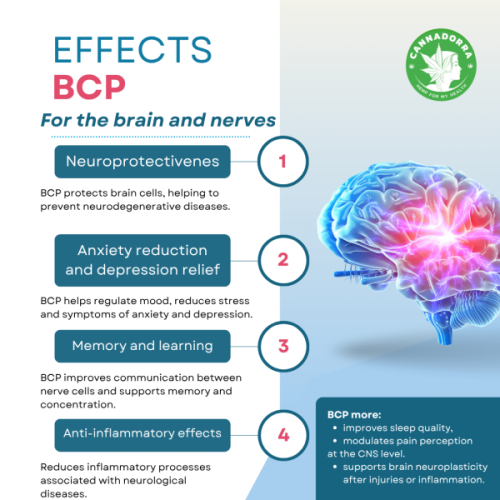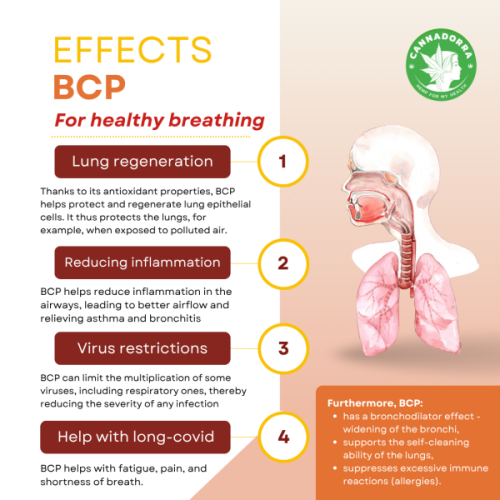Effects of BCP - how does betacarophyllene work?
Author: Lucie Garabasova
You may not have heard of it yet, but beta-caryophyllene (BCP) is a natural compound that is slowly but surely making its way into the spotlight of scientists and manufacturers of natural supplements. You can find it in essential oils such as clove, black pepper, basil, and hemp. And why is it so special? Unlike other substances that affect the endocannabinoid system, it does not affect the mind – and yet it can trigger important healing processes in the body.
What is beta-caryophyllene (BCP)?
BCP is a type of terpenoid – a natural substance that gives plants their characteristic aroma and often medicinal effects. It is a so-called sesquiterpene, which is used in the food, cosmetics, and perfume industries thanks to its aroma. But the most interesting thing is yet to come: BCP is one of the few natural substances that binds to the cannabinoid receptor CB2. And this is precisely what triggers a whole range of beneficial processes in the body – without any psychoactive effects.
You can also read all about what BCP is and where to find it HERE.
How does BCP work?The key role of the CB2 receptor
BCP acts as a selective agonist of the CB2 receptor, which means that it specifically binds to and activates this receptor. This receptor is part of the endocannabinoid system (ECS), which affects immunity, pain, inflammation and mood. Unlike the CB1 receptor, which is associated with the psychoactive effects of THC, CB2 acts mainly in the body - on cells of the immune system, in the digestive tract or in the heart.
What are the effects of BCP?
Strong anti-inflammatory effects
Research shows that BCP reduces levels of pro-inflammatory cytokines (e.g. TNF-α, IL-6, IL-1β), not only through CB2, but also through PPAR receptors - other important players in the regulation of inflammation and metabolism. This has the potential to help with chronic inflammatory diseases such as arthritis or inflammatory bowel disease.
Here is a link to a specific 2020 study looking at the anti-inflammatory effects of BCP.
Helps with depression and anxiety
Activation of CB2 receptors is now considered a promising approach for the treatment of a wide range of health problems, such as chronic inflammation, pain, atherosclerosis or osteoporosis. A review study highlights that beta-caryophyllene (BCP) has significant anti-inflammatory and immunomodulatory effects and highlights its potential in managing mental illnesses, especially depression and anxiety.
Thanks to its ability to influence inflammatory processes in the nervous system, BCP appears to be an interesting candidate for further research in the field of mental disorders, the incidence of which in the population is still increasing.
Here is a link to a study from 2024 that confirms the above.
Support for addictions
The study showed that beta-caryophyllene (BCP) can protect the liver from damage caused by excessive alcohol consumption. It helps to suppress inflammation, regulates the activity of immune cells in the liver (so-called Kupffer cells) and reduces the activity of molecules that are involved in the inflammatory reaction of blood vessels. In addition, it positively affects metabolic disorders in the liver. This protective effect depends on CB2 receptors.
The results suggest that BCP could be a promising aid in the treatment of liver diseases that are associated with inflammation and metabolic disorders - for example, alcoholic steatohepatitis.
🎯 Try BCP products too
They promote calm, balance and natural defenses without containing CBD or THC..
View productsStrong potential in the treatment of diabetes
A review study suggests that beta-caryophyllene (BCP) has promising potential as an adjunct in the treatment of diabetes and its complications. By activating CB2 receptors as well as PPAR-α and PPAR-γ receptors, it can influence important processes associated with the metabolism of sugars and fats. In addition, it has anti-inflammatory and antioxidant effects that help to suppress chronic inflammation and oxidative stress - factors that often worsen the course of diabetes. This combination of properties makes BCP drops an interesting candidate for use as a supportive agent in the treatment of this complex metabolic disease.
Protection of the heart muscle from damage
Research in an animal model has shown that beta-caryophyllene (BCP) can protect the heart from damage caused by doxorubicin - a powerful chemotherapy drug that is known for its side effects on the heart muscle. This protection was associated with the activation of CB2 receptors in heart tissue. When the researchers blocked the effect of CB2, the cardioprotective effect of BCP disappeared, confirming that this mechanism is key.
The results suggest that BCP could play a role as a supportive agent in chemotherapy - helping the body better tolerate the treatment and protecting the heart from its toxic effects.
The specific study is available HERE.
Use in Alzheimer's disease or multiple sclerosis
It can be used in these diseases due to its mild inhibition of cholinesterase (= enzymes that play a key role in the nervous system - their task is to break down acetylcholine, which is one of the main neurotransmitters (transmitters of nerve signals)) and also due to its neuroprotective and anti-inflammatory effects.
Other interesting effects:
- Antimicrobial effects - BCP can destroy harmful microorganisms, which makes it interesting as a natural preservative.
- Antioxidant - Helps protect cells from free radicals.
- Natural repellent and perfume ingredient – BCP's scent repels insects and smells pleasant at the same time.
Summary: A small molecule with enormous potential
Beta-caryophyllene (BCP) has gone from being an inconspicuous aromatic component of essential oils to the center of attention of the professional community across disciplines – from pharmacology to nutrition to natural cosmetics. Its uniqueness lies in the fact that it is a completely natural substance with a scientifically proven effect on the cannabinoid receptor CB2, which allows it to influence important bodily processes – without the psychoactive effects typical of some other cannabinoids.
Studies to date clearly show that BCP:
- soothes inflammation and regulates the immune response,
- protects the heart, liver and kidneys from damage,
- has a positive effect on the psyche, mood and stress resistance,
- can influence the course of metabolic disorders including diabetes, and may even have an effect on addictive behavior or neurodegenerative diseases.
But the list of its effects does not end there. Its antimicrobial properties make it an interesting tool in natural preservation. Its antioxidant power protects cells from oxidative stress, which contributes to aging and the development of a whole range of civilization diseases. In higher concentrations, BCP can act as a natural repellent, which makes it an attractive ingredient for the production of organic cosmetics, perfumes and protective products. And its effect on enzymes associated with Alzheimer's disease is even being studied, which opens the door to research in the field of cognitive health.
However, it is important to mention the downside - although BCP is generally considered safe, high concentrations when used topically can cause skin irritation or allergic reactions in some people. This indicates the need for further studies to precisely determine the optimal doses, appropriate forms of administration and long-term safety, especially when used in people with specific health conditions.
The Future of Beta-Caryophyllene: Between Nutrition, Therapy, and Sustainability
Interestingly, BCP is not only a “therapeutic hope,” but also a substance with broader industrial and ecological potential. There is talk of its use in the production of high-density biofuels, thanks to which it could also contribute to the sustainable technologies of the future.
Whether beta-caryophyllene appears in the form of capsules, ointments, natural repellents, or functional dietary supplements, its combination of biological efficacy, safety, and natural origin makes it a substance that is definitely worth following – whether you are a researcher, a therapist, or just someone looking for more natural paths to health and balance.



